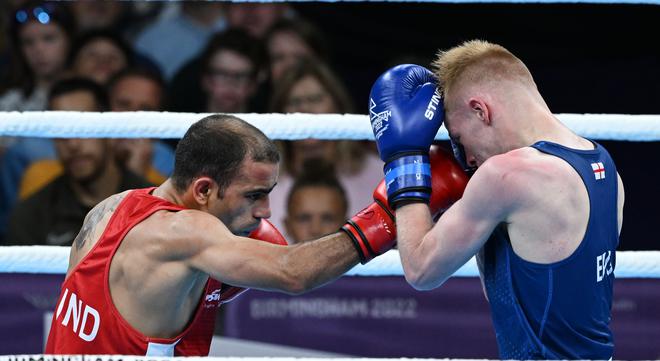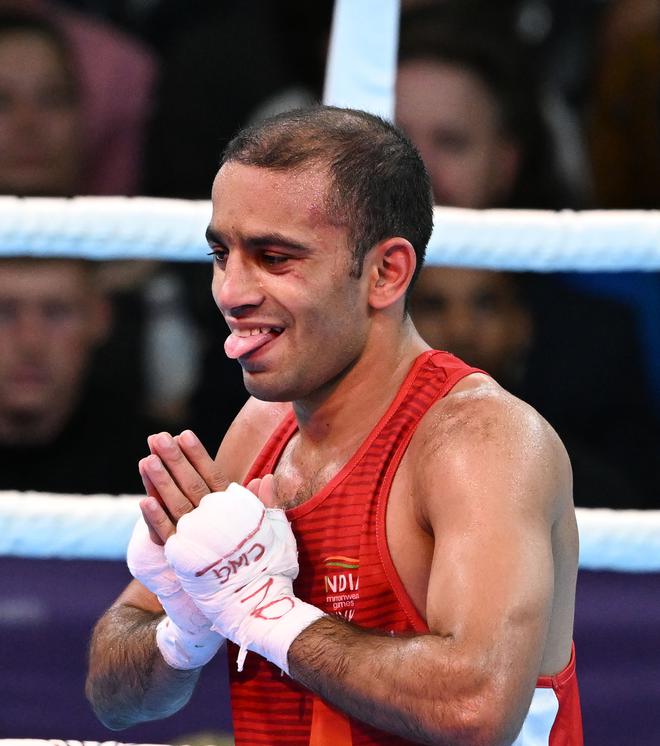

When Amit Panghal flashed his signature salute and his endearing smile after taming English boxer Kiaran MacDonald in the men’s 51kg final to win the long-cherished Commonwealth Games title in Birmingham, he redeemed his hard-earned reputation — which was built over several years but was soiled in six minutes in Tokyo about a year ago.
Ahead of the Tokyo Games, Amit had achieved something as astounding as entering the Olympics as the World No. 1 and top seed. Having claimed the honour of being the first Indian male boxer to bag a World Championships silver medal, an Asian Games gold, an Asian Championships gold and a Commonwealth Games silver as well as a few top titles, Amit had done everything he could do to emerge as the strongest medal prospect among the nine Indian boxers who had made the cut for the pandemic-affected Olympics.
Amit’s loss, after a first-round bye, to Rio Olympics silver medallist Yuberjen Martinez in the round of 16 was shocking not only for the top seed — who led after the first three minutes of his Games debut but eventually lost 4-1 — but also for the rest of India. It was hard to digest.
Still painful
Even today, a note of disappointment is clear in the voice of C.A. Kuttappa, who was the head coach of the Indian men’s boxing squad, when he revisits that forgettable episode of 2021.
Remembering how Amit oozed confidence in the build-up camp in Italy, Kuttappa says, “Amit used to say, ‘Sir, mera toh pucca medal hai. Main jeet ke dikhaoonga (I will medal for sure. I will win one).’ He had boxed with everyone who was there in the Olympics. He knew about every rival’s game and knew how to tackle each of them. He was well prepared.”
Rejecting the criticism that over-exposure to the aggressive Martinez during sparring sessions and a lack of endurance had led to the then World No. 1’s exit, Kuttappa said Amit’s recovery [after training] was not proper. Besides, the pressure of expectation on him was huge.
“There was criticism that Amit did more sparring with the Colombian, but we don’t accept that because the more training you do with a rival the more you know about his game. There are no surprises as you become familiar with his style.
“People forgot Amit’s previous performances and said he did not have stamina and did not practise well. That was really sad.”
Support system
Whatever be the reason, it was a massive setback for Amit, who switched himself off for a few months and relied on his inner circle to tide over the low phase.
Coach Anil Dhankar, who taught Amit the fundamentals of boxing, and a senior Army officer, who mentored him, were the persons apart from his family who stood by the champion boxer.
“People said Amit was finished. But it was his dedication that brought him back to the sport,” said Dhankar.
“We started from the basics when we began. He trained at the village ground, swam in the canal and ran on the sand.
“We had a lot of discussions on the psychological side of the sport. He is an Army man and his superior in the Army provided a lot of support during this period,” said Dhankar.
Having watched Amit closely from the time he joined the Indian Army, his superior provided the much-needed support at the time of crisis.
“Mainly, I gave him mental support. I was the person who processed his papers when he joined the Army in 2017. He is in my regiment,” said the senior Army officer, requesting anonymity.
“He was upset after getting out of the Olympics. The effort involved speaking to his parents, coaches, brother [Ajay, a former amateur boxer who is also in the Army]. It’s like handling a 12th standard student who is not scoring well. You have to speak to his school principal, class teacher, tuition teacher, parents and friends, the whole circle.”
The effort from his senior officer boosted Amit’s morale.
“I reminded Amit of the good times — how he defeated the Rio Olympics gold medallist [Hasanboy Dusmatov], the big medals he won, how he was the flag-bearer of Indian boxing. This had a positive impact on him.
“He has been maintaining his weight for about five years to remain in the lowest weight category. That’s a big challenge with the increase in age. It was also a big morale booster for him. I told him, ‘You are the only Army boxer who has done so well. You can change the colour of your Commonwealth Games medal’. And he did it,” said the Army officer.
Renewed, refreshed
When Amit rejoined the national camp in Patiala towards the end of 2021, the scar of Tokyo was not visible to others.
“When Amit returned to the camp, I did not see him doing anything different, whether it was his training or anything else,” said Kuttappa, who continued to serve as a coach in the national camp. “There was nothing to suggest that he was morally down. There was no negative thought, no hopelessness. His body language was the same as before. He was always funny. We made him understand that it’s a lesson for him. We told him, ‘It was your first Olympics, so no problems. Major competitions will come, you need to perform well there.’”
Amit did perform well at the Commonwealth Games, the first major competition post Olympics.
Kuttappa was happy to see the southpaw’s changes and mature handling of his opponents, especially those who box like street-fighters, inside the ring.
“There are some changes in Amit’s game. He used to land his cross punches with his right, but this time he landed the right straight. I told him not to box in medium and close range. I asked him to maintain a long range and go for scoring punches. He did that really well. He even boxed well in close and medium ranges.
“I was most impressed with his performance in the final. After the 2018 Asian Games, where he beat the Olympic gold medallist, I saw Amit boxing so well. He used his one-two combination and straight rights more to maintain a long range,” said Kuttappa.
A champion’s response
For Lalit Prasad, a national coach who saw Amit in action in Birmingham, the 26-year-old proved his class.
“Amit worked hard on his strength and endurance after the Olympics. Of course, his tactical game was always good. He was motivated to prove himself again.
“In the Commonwealth Games, he used his experience as he boxed well while taking care to stay safe. He upgraded the colour of his medal from silver to gold, and that’s the hallmark of a great boxer,” said Lalit.
Amit, who overcame a doping sanction due to his ‘ignorance’ early in his career to establish himself as a world beater, has again underscored his inherent fighting abilities and never-say-die attitude by leaping over the Olympics disappointment and reviving his career in style.
Having seen his dear student get back into his groove, Dhankar looks at the Tokyo episode as a blessing in disguise. “The setback has made Amit mature. His self-confidence is up and it will help him in future,” says Dhankar, with a sense of optimism.
Perhaps Amit has imbibed the positivity from his guru to bring bigger boxing laurels. The whole country will be elated if it can see the champion boxer flashing his signature salute and endearing smile time and again in elite competitions.







